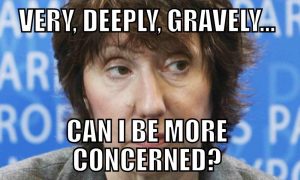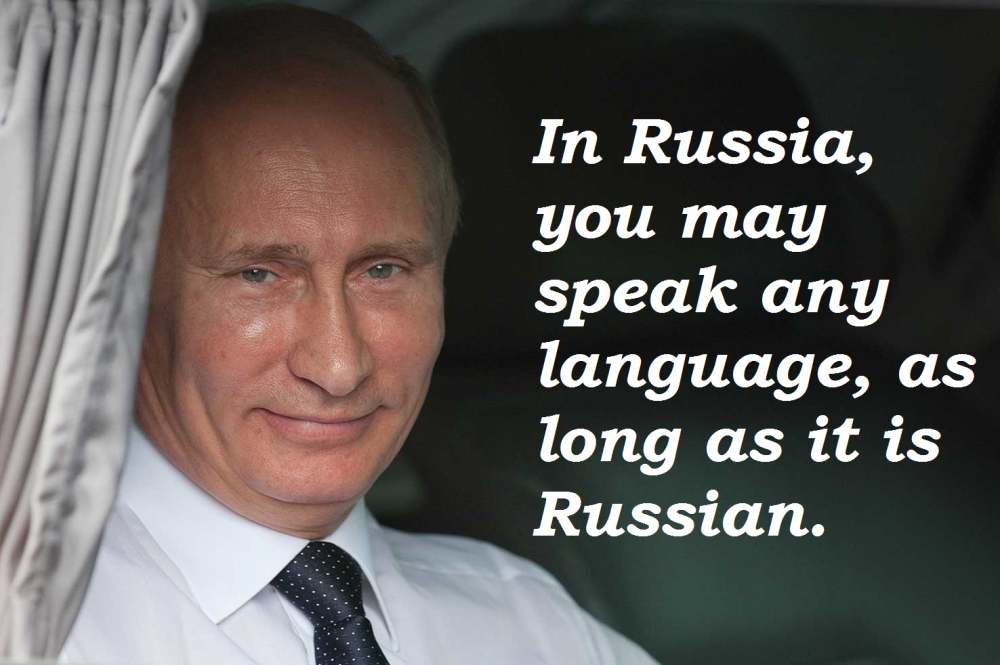by Adrian Bryttan
Call it double-talk, euphemisms, gobbledygook, or just plain lies, whatever…. Here’s what several phrases bandied about in newspaper and TV news ‘reports’ really mean:
‘local pro-Russian militia’ = Russian mercenaries
‘rebels’ = Russian mercenaries
‘pro-Russian separatists’ = Russian mercenaries
‘local self-defense forces’ = Russian mercenaries
‘Ukrainian separatists’ = Russian mercenaries
…while Western concern levels keep hitting new highs (or lows):
‘We are deeply concerned’ = we are sh**ting our pants
‘We are seriously concerned’ = we are sh**ting our pants, honest
‘We are increasingly concerned’ = we are sh**ting our pants, no kidding now
‘We are gravely concerned’ = please, just make it all go away!
‘I have not heard reports’ = of course I know…
‘We don’t know yet’ = we damn well know but will not say it…
It is important to realize Moscow’s focus is not on information, per se. At its core, Russian propaganda must defend the indefensible. (A long tradition starting with “Pravda” (truth?!) which continues today). Moscow double-talk experts and their troll armies in the media and internet are aiming at emotional buttons, using words like ‘defend’, ‘stabilize’, ‘protect’ the life and health of Russian ‘citizens’, ‘compatriots’, ‘ethnic’ Russians from a vague, non-existent ‘oppression’.
They knew people would be manipulated (at least for some time) by white paint with red crosses on trucks and tanks. They knew they had gained several important days while the media dickered over the Crimean invasion and repeated reports of “we’re not sure where these soldiers and tanks and equipment are from”. (One CNN reporter even walked up to a masked green man in boarding a personnel carrier to ask “So, where are you guys from?” Guys??? What was she thinking of?)
Russian Foreign Minister Sergei Lavrov often states ‘we want to help Ukrainians agree among themselves’. And what could sound more reasonable? Well, here’s the news descriptions of how they are ‘helping’:
‘humanitarian aid’ = Russian invasion
‘peace keeping forces’ = Russian invasion
‘uncontested arrival’ = Russian invasion
‘Russian incursion’ = Russian invasion
‘Russian entry’ = Russian invasion
‘unauthorized crossing’ = Russian invasion
‘reunification’ = Russian invasion
‘absorption’ = Russian invasion
‘major escalation’ = Russian invasion’
‘illegal action’ = Russian invasion’
‘military involvement’ = Russian invasion
Where do all these labels and talking points originate?
Well, in Europe many have been traced back to Russian Embassies and Consulates which sent the media Moscow’s weekly spin and disinformation – stories like Ukraine is “deeply divided” and “ethnic Russians fear oppression” and “fascist (neo-Nazi, junta etc) rabble of the Maidan”.
The powerful Podesta Group, a high-powered Washington advocacy and strategic communications group (“we work with Capitol Hill policymakers, recruit third-party allies, connect with the media and build coalitions to champion our clients’ agendas – in short, we know how to get things done.”) advocated for Yanukovych and the Party of Regions. Podesta Group and the public relations firm Mercury received lots of money from an innocuous sounding think thank in Brussels, the European Centre for a Modern Ukraine. In reality, the ECFMU was only a financial front for Sergei Klyuyev and the Party of Regions.
Speaking of money, American conservative bloggers and writers were paid to present stories favorable to the Party of Regions in 2012. At that time, articles echoing Yanukovych’s government appeared on leading conservative outlets like Red State, Breitbart and Pajamas Media.
Another crucial weapon is punctuation.
Quotation marks can imply verbal irony or doubt:
A Washington Post 8/22 headline: Russian aid convoy enters eastern Ukraine; Kyiv official denounces ‘invasion’.
– So, the word [invasion] is held up to question, but the Russian [aid convoy] is not?
Radio Free Europe 8/25 headline: Kyiv confronts ‘Russian’ armor as Moscow announces new aid convoy.
– So Kyiv’s report of the armor being Russian is questionable, but the convoy is definitely an aid convoy?
Then there is waffling and plain and simple goggledygook:
EU: “The information possessed by the EU concerning the human aid convoy is ‘insufficient’ and ‘controversial’.
There are many other examples that were used to blow smoke over things like a Crimean ‘referendum’, ‘rejoining’ Russian motherland, a ‘long shared and common history between Ukraine and Russia’, ‘Novorossiya’ (New Russia)…
Double-talk is not limited to media reporters. Finally, ISEUConcerned is a Twitter group that focuses on EU euphemistic gobbledygook with black humor:
Some tweets from that site showcasing the DoubleThink of today’s prevaricating Poloniuses :
“ISEUConcerned is the new watchdog of European (in)action! People accuse us of doing nothing. But we’re doing something everyday: expressing our concerns for example! Or selling weapons to Russia…”
“By sending Russia a message, we’re sending Russia a message about our commitment to sending a message to Russia.”
“If Russia won’t support peace in Ukraine, we’re ready for drastically measures. That means threatening Russia with more drastically measures.”
“We won’t negotiate with terrorists. But you, Untermensch, should!”





![bunny-rabbit-making-hand-shadow_thumb[3] copy](http://euromaidanpress.com/wp-content/uploads/2014/08/bunny-rabbit-making-hand-shadow_thumb3-copy-300x190.jpg)





